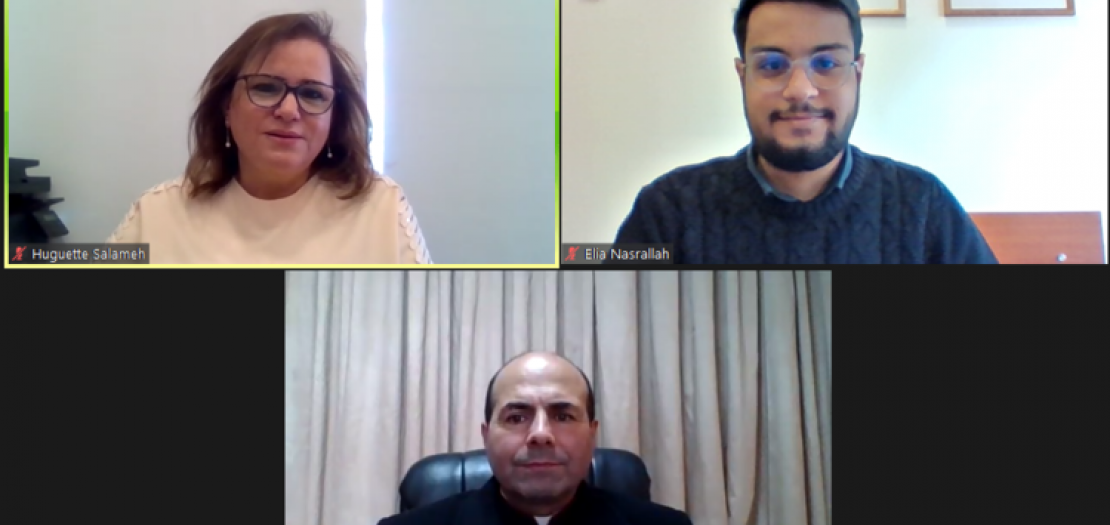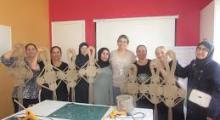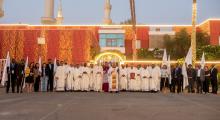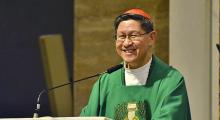Issued by the Catholic Center for Studies and Media - Jordan. Editor-in-chief Fr. Rif'at Bader - موقع أبونا abouna.org

For several decades now, unifying the date of Easter among all churches has been a problem that goes back to the emergence of early Christianity. However, the dream of “unity” on Easter, at least, has become something believers are thirsty for today, especially with massive differences and divisions in the Middle East where different ecclesiastical families live.
On Easter, every year, Christians ask many questions one of which is asked frequently: Which calendar is more accurate, western or eastern? When will we witness a unified holiday to celebrate with one heart the death and resurrection of Jesus Christ? Christ the Redeemer, who wanted us all to live in fraternity, what would he think if we disagree over a calendar? Several initiatives and dialogues have sought over the years to find solutions to unify Easter, but Christians haven’t seen any tangible results yet.
Why did this conflict even start in the first place? What are the obstacles that prevent unity on Easter? What about unity in Eastern Churches? All of these are questions we brought to the President of the Episcopal Committee for Ecumenical Relations in the Council of Catholic Patriarchs and Bishops in Lebanon and Pastor of the Maronite diocese of Zahle HE Bishop Joseph Mouawad, and he answered them during a private interview with the Communication and Public Relations Department of the Middle East Council of Churches, highlighting the impact of this difference on believers and the Church, as well as the importance of ecumenical formation consolidating unity.
First, what are the reasons behind the disagreement on unifying the date of Easter? What are the obstacles preventing it from happening?
Since the start of Christianity, Easter has been considered one of the oldest holidays, it lies at the heart of the Christian faith and the first evangelism was centered around Easter. Christians celebrate it annually on the Sunday following the Jewish Passover. In the second century, a group of Christians emerged from Anatolia, Asia Minor, and began celebrating Easter on the same day that Jesus Christ died, according to the Jewish calendar, on a different date from other Christians: on April 14, no matter what day of the week. Tension grew between these two parties and ended with everyone celebrating Easter on a unified date.
Unifying Easter was the focus of the Council of Nicaea activities, which was held on the year 325. It was agreed to adopt a unified rule for Easter celebration on the first Sunday after the first spring full moon, or after the equinox on March 21 and the full moon. Since then, Christians throughout the world celebrated Easter in the same period, according to the Julius Caesar calendar, despite some slight differences in the way the date of the feast is calculated. On 1582, His Holiness Pope Gregory XIII and a group of astronomers noticed a slight difference in the Julian calendar, and based on scholars he saw that the calendar needed to be corrected, and he deleted 10 days from the calendar from the month of October.
What His Holiness the Pope did is called the Gregorian Reformation, meaning the Gregorian calendar, which became different from the Julian calendar; The first is approved by the Catholic Church and the second by the Orthodox Church. Noting that another change then occurred in the method of calculation of the lunar cycle. These obstacles that started on 1582, are partly the reason for the difference in the celebration of the Resurrection between the Catholic and Orthodox Churches.
Has there been initiatives to unify the celebration of the Resurrection ever since?
After these events, many Catholic and Orthodox Churches called for to reunify the holiday. The Second Vatican Council commended their call, as participants in the annex to the Constitution on the Holy Liturgy recommended that the Council does not oppose the possibility of setting a unified day for the celebration of Easter, provided that all churches agree. However, this proposal did not meet expectations for several reasons.
Efforts to unify the holiday did not stop in ecclesiastical circles. On 1997, the World Council of Churches and the Middle East Council of Churches held a conference in Aleppo, Syria, to discuss foundations that contribute to achieving this step, in which representatives of various Catholic, Protestant, and Orthodox churches participated ... and based on the principle of the Council of Nicaea, several recommendations were issued calling for the unity of Easter. The conferees proposed not to rely on the Julian or Gregorian calendar, but on the more accurate scientific calculations available in that era, and that all churches should undertake some form of formation in preparation for this union.
Relying on the suggestion of the Council of Nicaea helps us celebrate Easter on the date Jesus Christ died, meaning the Easter of the Old Testament. According to the Gospel of John, Christ died on the Passover of the Old Testament, but gave a new meaning to Easter in the New Testament by liberating us from sin and death thanks to his redemption. Hence, the Council of Nicaea stresses the link between the Passover of the Old and New Testaments in the Bible. Thus, relying on the Council of Nicaea gives the theological dimension to Easter, as the old Passover was planned for the new Easter. On 1998, delegates from several Catholic and Orthodox churches in North America emphasized the solution presented by the two conferences in 1997 in Aleppo, but we have not witnessed any developments since that time.
Why didn’t we witness any new initiatives after the conference held in Aleppo?
For the Catholic Church, it is easy to make administrative decisions through the Pope or the Ecumenical Council, but the Orthodox Church relies on an Orthodox Ecumenical Council for consensus on any issue. Churches need to study and evaluate the decision to unify Easter according to the principle of the Council of Nicaea, in order for the appropriate decision to be taken.
On the other hand, it is said today in Orthodox and Catholic ecclesiastical circles that churches began preparing for the 1700th anniversary of the Council of Nicaea in 2025. Many Orthodox and Catholic figures propose to take an ecumenical dimension of this memory, the first of which lies in the law of faith, then the Unifying Easter. This commemoration may constitute an incentive for inviting the Catholic and Orthodox Churches to accept the decisions of the Council of Nicaea. However, it should be noted that the two Churches originally depend on this principle, except for the difference in the method of calculating the date of this holiday. Hence, the participants in the Aleppo conference, in 1997, proposed not to adopt either the Julian and the Gregorian calendar, but rather adopt modern scientific calculations.
It is true that the difference in unifying Easter takes a technical dimension in the method of calculations, but also an ecclesiastical dimension appears that requires church officials to meet together and study the next steps. Thus, avoiding differences lies in cooperation and dialogue between all Churches, in order to find solutions. This is what helps ecclesiastical families believe any new step in unifying of the holiday and the date calculation.
How does the difference influence the life of the Church and its believers?
Unifying the holiday has a great influence on the theological, pastoral and missionary levels. From the theological point of view, there are no doctrinal differences between the Catholic and Orthodox Churches regarding the death and resurrection of Christ. They acknowledge this fact and consider it central and essential in the heart of the Christian faith and affirm that Christ offered redemption through his death. When we celebrate together at the same time, we demonstrate the unity of our faith in this truth and bear witness to this one theology.
As for pastoralists, we as pastors know how people feel and regret the existence of a difference in the history of the holiday over the years. For example, the Catholic Church celebrates this year the Feast of the Resurrection on April 4th, while the Orthodox Church celebrates it 4 weeks after, on May 2nd. Unfortunately, this reminds us of the division that exists between the Churches. Unifying the holiday strengthens the bonds of fraternity between us and gives comfort to believers, to prove that faith unites them despite differences in the date of the celebration of the holiday. It is true that we haven’t reached full communion in faith yet, but several facts did prove the existence of many ties between Catholic and Orthodox Christians.
On a missionary level, every step towards unity further consolidates our testimony throughout the whole world. It also opens up wider ecumenical horizons, whereby the unity of the holiday forms a motive for resolving other issues, especially those related to beliefs. It would deepen the fraternal communion between each other.
Can Middle Eastern churches take the decision to separate from churches throughout the world and follow one unified calendar? This is a very sensitive issue, it needs to be studied in depth, especially as it faces several obstacles preventing any decision or answer. The question here is the following: “Can churches, according to their geographical location, choose a suitable time that is different from other churches around the world, especially since they all meet under one communion?
The doctrinal difference exists between churches but not in the essence of the holiday, despite their location in the same geographical area, as each church declares the faith of the ecclesiastical family it is affiliated with. I think it is best to work on finding solutions on a global level among all churches. We are witnessing many efforts to achieve the desired goals, but are there future repercussions that undermine the relationship between the Churches in the Middle East and the ecclesiastical families to which they belong in the world? We hope to eventually reach a comprehensive and sound agreement between all Churches, Catholic and Orthodox.
There is no doubt that celebrating Easter together leaves a positive impact on believers and non-believers. It symbolizes unity among all. However, despite the difference that lies in determining the date of the holiday, we stress that we are all united in the same faith, and we acknowledge that Christ offered redemption for humans to share with us his resurrection from death, which is the basis of our Christian faith. We can also seek this unity through prayer and expressing this desire to pastors, who in turn transmit it through their ecclesiastical experience to the ecclesiastical family to which they belong, and this is what constitutes an incentive for the unity of Easter.
What is the role of the ecumenical formation here?
I wish to transfer the ecumenical spirit to school and university curricula, but it is also necessary for churches to help in this ecumenical formation. An ecumenical sense exists today among believers, significantly more than in the past years. The ecumenical movement includes several dimensions such as spiritual ecumenism through prayer for Church unity, theological and ecumenical dialogues and on social and pastoral levels... Some dimensions are shared among believers, while others, such as the theological dialogue, require specialists in theology to carry out it.
It is worth noting that the Middle East Council of Churches plays a great role in promoting the ecumenical spirit, as it also cooperated with the Ecumenical Committee of the Council for Catholic Patriarchs and Bishops in Lebanon to launch together prayer meetings in the regions for Church unity. Thanks to this activity, these prayer meetings have been intensified today, especially during the week of prayer for Christian unity. As an ecumenical committee, we began several years ago to organize training sessions on the ecumenical movement in Lebanon, in which a group of believers, monks, nuns and priests participated, but we had to put it on hold due to the Coronavirus, hoping that we would resume this activity as soon as possible.
We noticed the openness of believers in the various ecclesiastical families, specifically in Lebanese regions. Therefore, it is not difficult to carry out an ecumenical movement based on the development of fraternal love between us as shepherds and among believers, and on the development of spiritual ecumenism through prayer and social solidarity, especially as believers are waiting for such initiatives.







